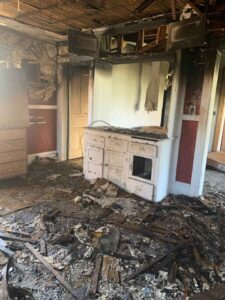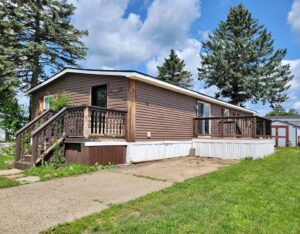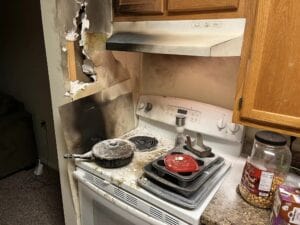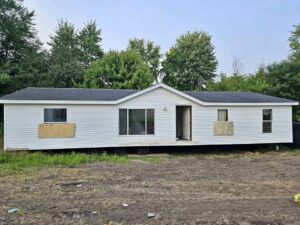Did you know that a single mobile home fire can leave behind a trail of destruction, impacting both property and lives? These fires have the potential to cause devastating consequences that demand our immediate attention. With an alarming frequency, mobile home fires underscore the urgent need for heightened fire safety awareness in our communities. Understanding the severity and impact of these incidents is paramount in preventing future tragedies.
Preventing Mobile Home Fires: Safety Tips & Guidelines
The cause of these fires is often multifaceted, making it crucial for us to explore the underlying factors contributing to their occurrence. By shedding light on this issue, we can equip ourselves with knowledge and take proactive measures to protect our homes and loved ones from such catastrophic events.
In the following paragraphs, we will delve deeper into the complexities surrounding mobile home fires, examining their causes and exploring effective strategies for prevention. Let’s uncover the truth behind these incidents to ensure a safer future for everyone involved.

Highlighting the Destruction Caused by Mobile Home Fires
Mobile home fires have devastating consequences that often result in complete destruction, leaving families homeless and their lives shattered. The rapid spread of flames within these structures exacerbates the level of destruction, making it difficult to contain the blaze and save valuable possessions.
Mobile homes, also known as manufactured homes, are particularly vulnerable to fires due to their construction materials and close proximity within mobile home parks. When a fire breaks out in a mobile home park, it can quickly engulf multiple homes, resulting in widespread damage and potential loss of life.
Distressing Aspects: Mobile Home Fires
One of the most distressing aspects of mobile home fires is the significant loss of personal belongings. Families often lose cherished items that hold sentimental value or cannot be replaced easily. Photos, heirlooms, and other irreplaceable mementos are frequently lost or damaged beyond repair in these tragic incidents.
The destruction caused by mobile home fires extends beyond material possessions; it can also lead to injuries and even fatalities. Civilian deaths resulting from these fires are a harsh reality that cannot be ignored. Each year, news outlets report heartbreaking stories of lives lost due to mobile home fires. These incidents serve as a stark reminder of how crucial it is to prioritize fire safety measures within these communities.
To grasp the magnitude of this issue, one only needs to browse through YouTube or news channels like 12News for live footage capturing the devastation caused by mobile home fires. The intensity of the flames coupled with limited escape routes poses a grave threat to residents trapped inside these homes during an inferno.
Proactive Steps: Mobile Home Fires
In an attempt to mitigate such tragedies, it is essential for mobile homeowners and residents alike to take proactive steps towards fire prevention. This includes installing smoke detectors in every room, practicing regular fire drills with family members, maintaining clear evacuation paths, and adhering to safety guidelines provided by local authorities.
Furthermore, mobile home park owners and managers play a vital role in ensuring the safety of their residents. They should prioritize fire safety inspections, enforce regulations regarding flammable materials and overcrowding, and provide adequate fire suppression systems within the park.

Discussing Common Causes of Mobile Home Fires
Electrical Malfunctions are a Leading Cause of Mobile Home Fires
Electrical malfunctions are one of the primary culprits behind mobile home fires. These malfunctions can occur due to outdated wiring, faulty electrical appliances, or improper installation. In many cases, mobile homes may not have been built with the same safety standards as traditional houses, making them more susceptible to electrical issues.
One common problem is overloaded circuits. Many people living in mobile homes tend to use extension cords and power strips extensively, plugging multiple devices into a single outlet. This overload can lead to overheating and ultimately result in an electrical fire. It is crucial for residents to be mindful of their power usage and avoid overloading circuits.
Another potential hazard is faulty wiring. Mobile homes often have older electrical systems that may not meet current safety codes. Over time, these wires can deteriorate or become damaged, increasing the risk of short circuits and sparks that can ignite a fire. Regular inspections by qualified electricians can help identify any potential hazards and ensure proper maintenance.
Careless Smoking Practices Pose a Significant Risk for Starting Fires in Mobile Homes
Careless smoking practices contribute significantly to the occurrence of mobile home fires. Many people underestimate the danger of smoking indoors or near flammable materials within their mobile homes. The combination of open flames and combustible materials creates an ideal environment for disaster.
A dropped cigarette butt or an unattended lit cigarette can easily ignite nearby furniture, curtains, or other highly flammable items present in close proximity within a confined space like a mobile home. It is essential for smokers to exercise caution and avoid smoking indoors altogether if possible.
To reduce the risk further, it is advisable for smokers to designate specific outdoor areas away from their mobile homes where they can safely smoke without endangering themselves or their property. Providing fire-resistant ashtrays outside can help prevent accidental fires caused by improperly discarded cigarette butts.
Cooking Accidents, Such as Unattended Stoves, Contribute to a High Number of Mobile Home Fires
Cooking accidents are another prevalent cause of mobile home fires. The hustle and bustle of daily life can sometimes lead to distractions in the kitchen, resulting in unattended stoves or ovens. In the confined space of a mobile home, even a momentary lapse in attention can have disastrous consequences.

Unattended cooking appliances can quickly overheat and ignite nearby flammable materials. Grease fires are also common when cooking oil reaches its smoke point and catches fire. These fires can spread rapidly if not promptly extinguished, causing extensive damage to the mobile home and putting lives at risk.
To prevent cooking-related fires, it is crucial to never leave the kitchen unattended while cooking. If you need to step away briefly, turn off all heat sources and remove any flammable items from the stove area. It’s also essential to keep a fire extinguisher within easy reach in case of emergencies.
By addressing these common causes of mobile home fires—electrical malfunctions, careless smoking practices, and cooking accidents—we can reduce the risk of these devastating incidents. Taking proactive measures such as regular electrical inspections, practicing safe smoking habits outdoors, and being vigilant while cooking can help ensure the safety of residents and their homes.
Tips for Fire Prevention in Mobile Homes
Regularly inspecting electrical systems can help prevent potential fire hazards.
One of the most important steps in preventing fires in mobile homes is to regularly inspect the electrical systems. Over time, wear and tear can occur, leading to faulty wiring or overloaded circuits that increase the risk of fire. By conducting routine inspections, you can identify any potential hazards and take immediate action to rectify them.
During an inspection, check for any frayed or damaged wires. These should be replaced promptly to avoid a potential fire hazard. Ensure that all outlets are functioning properly and not overloaded with too many devices plugged in at once. If you notice any flickering lights or frequently blown fuses, it is essential to address these issues promptly as they may indicate underlying electrical problems.
Installing smoke detectors and fire extinguishers is essential for early detection and control.
Equipping your mobile home with smoke detectors and fire extinguishers is crucial for early detection and control of fires. Smoke detectors serve as an initial line of defense by alerting you to the presence of smoke or a potential fire. It is recommended to install smoke detectors in every room, including bedrooms and living areas, as well as outside sleeping areas.
Regularly test your smoke detectors to ensure they are functioning correctly by pressing the test button. If batteries are required, make sure they are replaced at least twice a year or whenever low battery alerts sound. Remember that having a working smoke detector does no good if its batteries are dead.
In addition to smoke detectors, having accessible fire extinguishers throughout your mobile home is equally important. Place them in easily reachable locations such as the kitchen, bedrooms, and near exits. Familiarize yourself with how to use a fire extinguisher effectively so that you can quickly respond in case of an emergency.
Practicing safe cooking habits reduces the risk of kitchen fires.
Kitchen fires are one of the leading causes of mobile home fires. Practicing safe cooking habits can significantly reduce the risk of these incidents. One of the most important rules is to never leave food unattended while cooking. Even a momentary distraction can lead to a fire starting and spreading rapidly.
Always ensure that your cooking area is clean and free from any flammable materials such as kitchen towels or curtains. Keep a close eye on pans and pots while they are on the stove, using timers if necessary to remind you when food is ready. Avoid wearing loose clothing that could catch fire, and use oven mitts or heat-resistant gloves when handling hot dishes or cookware.
If a grease fire occurs, do not attempt to extinguish it with water as this will only make it worse. Instead, use a metal lid or baking sheet to smother the flames, turn off the heat source, and call emergency services if needed.
By following these tips for fire prevention in mobile homes, you can significantly reduce the risk of fires and protect your property and loved ones. Regularly inspecting electrical systems, installing smoke detectors and fire extinguishers, and practicing safe cooking habits are essential steps towards ensuring a safer living environment in your mobile home. Stay vigilant and take proactive measures to prevent fires before they occur.
Understanding the Consequences and Emotional Toll of Mobile Home Fires
Mobile home fires can have devastating consequences that go far beyond physical damage. The emotional trauma experienced by those affected is often overlooked but plays a significant role in the aftermath of such incidents. Let’s delve into these consequences and understand the toll they take on individuals.
Losing sentimental items and cherished memories intensifies the emotional burden faced by victims of mobile home fires. These fires not only destroy material possessions but also erase irreplaceable mementos that hold immense personal value. Family photo albums, heirlooms passed down through generations, and other sentimental objects are all vulnerable to the destructive power of flames. When these precious items are reduced to ashes, it feels like losing a part of oneself.
Rebuilding Lives: Preventing Mobile Home Fires
Rebuilding lives after a mobile home fire requires substantial time, resources, and support. The process can be overwhelming for those who have lost everything in an instant. Finding temporary shelter, replacing essential belongings, and navigating insurance claims become daunting tasks amidst the emotional turmoil. Moreover, many victims face financial constraints that hinder their ability to rebuild their lives quickly.
The psychological impact of a mobile home fire cannot be overstated. Survivors may experience anxiety, depression, post-traumatic stress disorder (PTSD), or survivor’s guilt as they grapple with the aftermath of such a traumatic event. The fear of another fire occurring or reliving the horrific experience can haunt them for years to come. Sleep disturbances, nightmares, and flashbacks further exacerbate their emotional distress.
Support Networks: Mobile Home Fire Losses
Support networks play a crucial role in helping individuals cope with the emotional toll of mobile home fires. Friends, family members, community organizations, and mental health professionals all contribute to providing much-needed assistance during this challenging period. Their presence offers comfort and reassurance while helping survivors navigate their emotions and rebuild their shattered lives.
It is important for society as a whole to recognize the profound impact that mobile home fires have on individuals’ emotional well-being. By fostering empathy and understanding, we can create a supportive environment that aids in the healing process. Communities can organize fundraisers, donate essential items, or offer counseling services to those affected by these devastating fires.
Efforts to Assist Individuals Affected by Mobile Home Fires
Emergency Assistance from Various Organizations
When a mobile home fire occurs, it can be a devastating experience for the individuals involved. However, there are several organizations that step in to provide emergency assistance and support during these difficult times. Firefighters and rescue crews work tirelessly to extinguish the flames and ensure the safety of everyone involved. These brave men and women put their lives on the line to protect people and property.
In addition to the efforts of firefighters, various organizations offer aid to those impacted by mobile home fires. Local community groups often rally together to provide immediate relief such as food, clothing, and shelter. Non-profit organizations like the American Red Cross also play a crucial role in assisting affected individuals by offering temporary housing options, financial assistance for essentials, and emotional support.

Temporary Housing Options for Displaced Families
One of the primary concerns for families affected by mobile home fires is finding temporary housing while they recover from the incident. Recognizing this need, different initiatives have been put in place to address this issue. The local fire department or disaster response teams may collaborate with community partners to set up emergency shelters where displaced families can stay temporarily.
Furthermore, some organizations offer hotel vouchers or rental assistance programs specifically designed for families affected by disasters like mobile home fires. This helps alleviate some of the stress associated with finding suitable accommodation during recovery periods.
Read more on our article Temporary Mobile Home Housing While Building
Community Support Networks: Preventing Mobile Home Fires
Community support networks are invaluable. They provide emotional support, connect individuals with necessary resources, and help rebuild lives after such traumatic incidents.
Local fire departments often work closely with community organizations to ensure that accurate information reaches those impacted by mobile home fires. They may use social media platforms such as Facebook and Twitter or even develop dedicated apps where people can access real-time updates about available resources and ongoing investigations.
For instance, WFXR News in Arizona has developed an app that allows people to receive fire safety information, download emergency preparedness guides, and stay informed about ongoing investigations. This kind of community engagement helps affected individuals stay connected and informed during the recovery process.

Statistics and Data on the Frequency and Impact of Mobile Home Fires
Each year, thousands of mobile home fires occur, resulting in significant property damage and loss of life. Mobile homes, due to their construction materials, are more susceptible to fires compared to traditional houses.
Mobile home fires have a higher rate of occurrence than one might expect. The combination of flammable materials used in their construction, such as lightweight aluminum siding and thin walls made of combustible materials like particleboard, increases the risk significantly. These factors make it easier for a fire to spread rapidly through a mobile home, often leaving little time for occupants to escape safely.
Preventing Mobile Home Fires: The Impact They Cause
The impact of mobile home fires is devastating both in terms of property damage and loss of life. The financial burden caused by these fires is substantial, affecting not only individuals but also insurance companies. In many cases, victims lose everything they own when their mobile homes are consumed by flames. This loss can be particularly challenging for those who lack adequate insurance coverage or financial resources to recover from such a disaster.
Moreover, the frequency and severity of mobile home fires highlight the urgent need for increased awareness and preventive measures within this specific housing sector. Education campaigns targeting mobile homeowners should emphasize fire safety practices tailored specifically to the unique vulnerabilities associated with these dwellings.
To mitigate the risks associated with mobile home fires, several proactive steps can be taken:
Proactive Steps to Fires
Install smoke detectors: Ensure that working smoke detectors are installed in every room of the mobile home. Regularly check batteries and replace them as needed.
Practice proper electrical maintenance: Faulty wiring is a common cause of mobile home fires. Have an electrician inspect your electrical system regularly to identify any potential hazards.
Exercise caution while cooking: Cooking-related incidents are another leading cause of residential fires in general. Be vigilant when using stoves or other cooking appliances inside your mobile home.
Create an evacuation plan: Develop an emergency evacuation plan with all members of your household. Identify escape routes and designate a safe meeting point outside the home.
Keep flammable materials away: Store flammable substances, such as gasoline or propane tanks, in a secure location away from the mobile home to minimize fire risks.
By implementing these preventive measures and promoting fire safety awareness, we can reduce the frequency and impact of mobile home fires. It is crucial for individuals, communities, and policymakers to work together to protect lives and property within this vulnerable housing sector.
Dryer Vents: Preventing Mobile Home Fires
Many fires are caused by dryer vents getting plugged up. Be sure to check your dryer vent often to make sure the air is flowing out of the vent.
For more details read our article: Mobile Home Dryer Vent
Conclusion: Preventing Mobile Home Fires
In conclusion, mobile home fires can have devastating consequences for individuals and communities. The destruction caused by these fires highlights the urgent need to promote fire safety awareness in mobile homes. By understanding the common causes of mobile home fires and implementing preventative measures, we can significantly reduce the risk of such incidents.
It is crucial to recognize the emotional toll that mobile home fires can take on those affected. The loss of property and personal belongings can be overwhelming, leading to long-lasting effects on mental well-being. Efforts must be made to support and assist individuals who have experienced these traumatic events.
Statistics and data reveal the frequency and impact of mobile home fires. These numbers emphasize the importance of taking proactive steps towards fire prevention in this specific housing setting. By raising awareness about fire safety practices, we can help protect lives and minimize property damage.
To address this issue effectively, it is essential for communities to come together and prioritize fire safety education in mobile homes. Local authorities, organizations, and individuals should collaborate to develop comprehensive programs aimed at preventing mobile home fires. These initiatives should include resources such as informational campaigns, workshops, and access to affordable smoke detectors and fire extinguishers.
Final Thoughts: Mobile Home Fires
Promoting fire safety awareness in mobile homes requires a collective effort from all stakeholders involved. By sharing information about best practices for preventing fires in this unique housing setting, we can empower individuals with knowledge that will help keep them safe. This will also help to prevent mobile home fires in the future.
Remember: your safety is paramount! Take action today by implementing simple yet effective measures like regularly checking smoke detectors, practicing safe cooking habits, avoiding overloading electrical outlets, ensuring proper maintenance of heating systems, and having an evacuation plan in place.
Let’s work together to prevent mobile home fires and create safer living environments for everyone!
FAQs: Preventing Mobile Home Fires
How common are mobile home fires?
Mobile home fires are unfortunately quite common due to various factors such as aging electrical systems or improper use of heating sources. Statistics show that they account for a significant portion of residential fire incidents.
What are some common causes of mobile home fires?
Common causes of mobile home fires include electrical malfunctions, cooking accidents, heating equipment issues, smoking-related incidents, and arson. It is crucial to be aware of these risks and take preventative measures.
How can I prevent a fire in my mobile home?
To prevent fires in your mobile home, ensure that smoke detectors are working correctly, avoid overloading electrical outlets, practice safe cooking habits, maintain heating systems properly, and have fire extinguishers readily available.
What should I do if a fire breaks out in my mobile home?
If a fire breaks out in your mobile home, evacuate immediately and call emergency services. Make sure everyone in the household knows how to exit safely and has a designated meeting point outside the home.
Are there any resources available for individuals affected by mobile home fires?
Yes, there are resources available to assist individuals affected by mobile home fires. Local organizations and authorities often provide support such as temporary shelter, food assistance, clothing donations, and counseling services. Reach out to local community centers or disaster relief organizations for more information.
You might also be interested in our articles:
